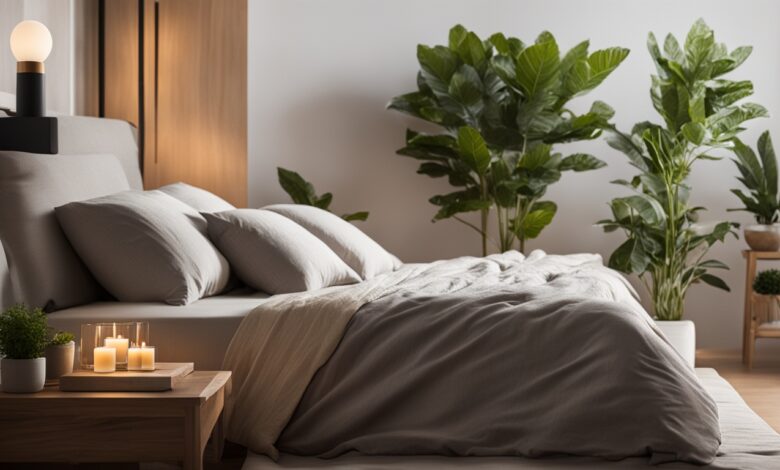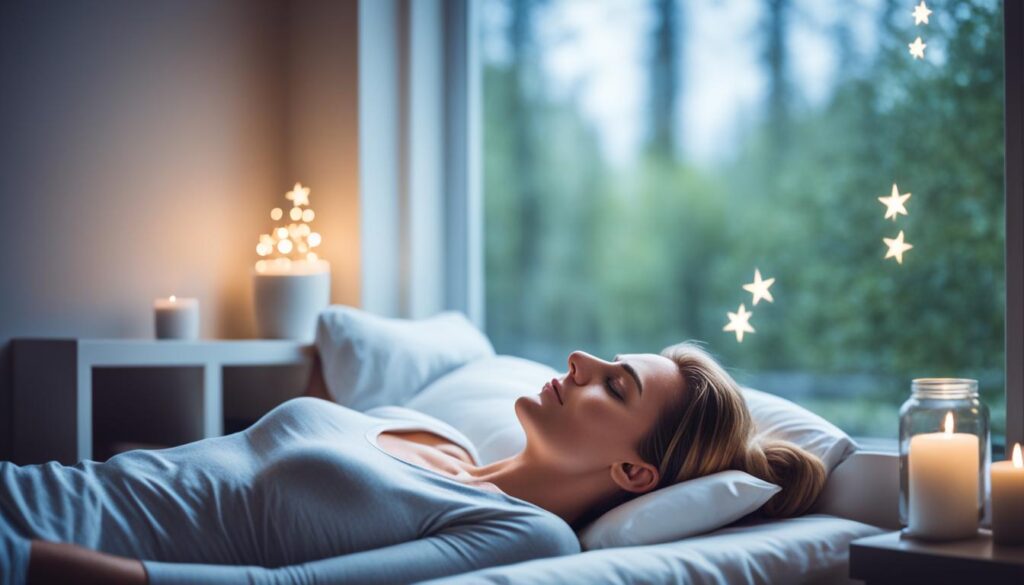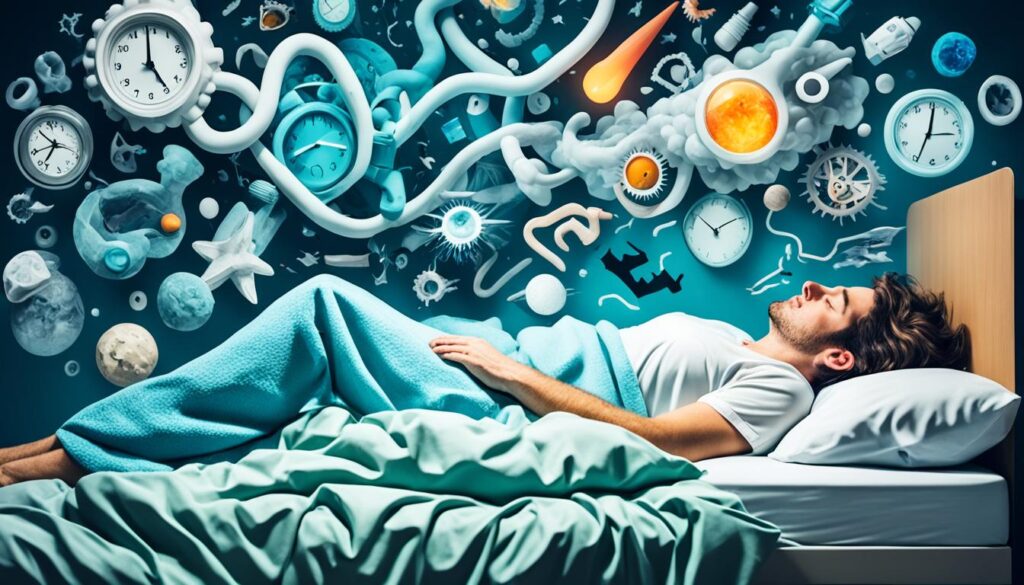Improve Sleep Quality: Top 10 Tips to Fall Asleep Fast – Mindsterk

Do you find it hard to fall asleep quickly and enjoy a restful night? Are you searching for ways to better your sleep and wake up rejuvenated? Whether it’s occasional trouble sleeping or constant insomnia, enhancing your sleep routine is key for your health.
Many don’t see sleep’s big role in mental health. Yet, better sleep can lift your spirits, lower stress, and ease anxiety. So, how can you improve your sleep? Let’s look at some helpful tips and tricks to transform your sleep quality.
But first, let’s talk about why sleep is so important for both your body and your mind.
Establish a Good Sleep Routine (Sleep Hygiene Tips)
Having a consistent sleep routine is crucial for better sleep. Studies show that sticking to regular bedtimes and wake times helps. This can improve sleep quality [source].
Going to bed and waking up at the same time every day is important. Even on weekends. This helps set your body’s internal clock, making sleeping and waking up easier. A consistent routine is key.
Engaging in relaxing activities before bed is good. This could be reading a book, taking a warm bath, or enjoying soft music. The aim is to create a peaceful setting that welcomes relaxation.
Avoid electronic devices an hour before bed. They can disrupt your sleep hormone, melatonin. Instead, consider reading a book or practising relaxation exercises.
Sticking to a consistent sleep routine can boost your sleep hygiene and quality. Our bodies love regularity, and healthy sleep habits can improve overall health [source].
Relaxation Techniques for Better Sleep:
Relaxing activities can make a big difference in getting better sleep. Adding relaxation techniques to your night routine helps create a restful environment. Techniques like meditation, deep breathing, and mindfulness can improve sleep quality and well-being.
Meditation for Sleep:
Meditation is a great way to relax and get a better night’s sleep. It focuses your mind and clears the thoughts that keep you up. By finding calmness through meditation, you can fall asleep faster and have a peaceful night. Try guided meditation or meditation to relax and refresh your mind for better sleep deeply.
Mindfulness for Sleep:
Mindfulness is another technique that helps with good sleep. It involves being in the moment and accepting your thoughts calmly. Practising mindfulness before bed can settle your mind and body, getting you ready for sleep. Techniques like reframing thoughts and managing worries promote tranquillity at bedtime.
Not every relaxation technique works for everyone. It’s important to try different ones to see what fits you. Adding techniques like meditation and mindfulness to your routine can help you relax and get better sleep.
Create the Right Sleep Environment:
To improve sleep quality and fall asleep faster, it’s vital to have a good sleep environment. This means the conditions and surroundings where you sleep. Things like lighting, noise, and temperature are all part of this.
Here are some tips to make your sleep environment better:
1. Dark and Quiet Room
For better sleep, your room should be dark and quiet. Bright or artificial light can mess with your sleep cycle. Try using curtains or blinds to block outside light. Also, keep devices like phones away to reduce distractions.
2. Temperature for Sleep
The temperature of your room affects how well you sleep. A cooler room helps more than a warm one. Aim to keep it between 60-67 degrees Fahrenheit (15-19 degrees Celsius). You might need to adjust your thermostat or use a fan.
3. Noise Reduction
Keeping your room quiet is key for uninterrupted sleep. Noise from traffic or neighbours can wake you up. Earplugs or white noise machines can help block out this noise. They can make sounds like rain or ocean waves to help you sleep better.
To boost your sleep quality, ensure your sleeping area is dark, quiet, and cool. Tailor your space to what feels best for you. Doing so can lead to restful sleep.
A sleep-friendly environment is important for quality rest. Use these suggestions to craft the ideal space for sleep. And enjoy better sleep because of it.
Avoid Forcing Sleep:
Trying to force sleep can actually make things worse. It’s better to listen to what your body needs. If sleep doesn’t come easily, don’t push it. Feeling frustrated and anxious is common if you try too hard.
Instead, do something calming if you can’t sleep. You could read, listen to soft music, or stretch gently. This can help you relax instead of stressing about sleep. Go back to bed when you feel more tired.
Using relaxation methods can really help get your mind and body ready for sleep. Adding calm activities to your nighttime routine can make it easier to fall asleep without trying too hard.

| Relaxation Techniques |
|---|
| Avoid stimulating activities before bed |
| Engage in a calming activity like reading or listening to soft music |
| Practice deep breathing exercises or meditation |
| Consider journaling or writing down worries to clear the mind |
| Try progressive muscle relaxation to release tension |
Using these techniques can help you feel more peaceful and encourage sleep to come naturally. Remember, don’t try to force sleep. Focus on feeling relaxed, and let sleep find you.
Improve Sleep through Diet and Exercise:
Eating well and staying active can make sleeping easier. Choosing what to eat carefully and exercising daily improves sleep and health.
Avoid big meals before bed. Light, nutritious meals are best. The Mediterranean diet, full of fruits, veggies, and good fats, boosts sleep. Cut down on caffeine, alcohol, and nicotine to sleep better.
Exercise helps with deep sleep. But don’t work out too close to bedtime. Aim to exercise earlier so you have time to relax at night.
Mixing a healthy diet with regular exercise prepares us for a great night’s sleep. These habits help us nod off quicker and sleep sounder, improving sleep quality.
“A well-balanced diet and regular exercise are key components in improving sleep quality and overall well-being.” – Sleep Research Institute
The Sleep and Diet Connection
What we eat affects our sleep. Some nutrients and foods can help or hinder our sleep cycle.
| Food Group | Sleep Benefit | Examples |
|---|---|---|
| Complex Carbohydrates | Stimulate the production of serotonin, a hormone that promotes relaxation and sleep. | Whole grains, legumes, sweet potatoes |
| Lean Proteins | Provide amino acids that play a role in the production of serotonin and melatonin, promoting sleep | Chicken, turkey, tofu |
| Fruits and Vegetables | Contains antioxidants and vitamins that support overall health and may contribute to better sleep. | Blueberries, spinach, broccoli |
| Healthy Fats | Help regulate hormone levels and promote satiety, contributing to a more restful sleep | Avocados, nuts, seeds |
| Stimulants | It can disrupt sleep patterns and make it harder to fall asleep | Caffeine, alcohol, nicotine |
Eating a balanced diet from various food groups covers all nutrients for better sleep. Remember, diet needs differ per person. Talk to a healthcare expert or dietitian for a personalized diet plan that supports good sleep.
Learn About Sleep Disorders:
Understanding sleep disorders helps us know why we sometimes can’t sleep well. Two main sleep disorders are insomnia and sleep apnea. Both greatly affect how well we sleep.
Insomnia
Insomnia makes falling or staying asleep hard. Stress, anxiety, certain meds, and health issues can cause it. It leads to being tired during the day, having trouble focusing, and feeling moody. Insomnia affects how you feel overall.
Sleep Apnea
Sleep apnea means your breathing stops and starts while you sleep. It’s marked by loud snoring and feeling very sleepy during the day. Untreated, it may lead to serious health problems like high blood pressure, heart issues, and stroke.
“Sleep disorders like insomnia and sleep apnea can significantly impact sleep quality and overall well-being.” – Dr. Sarah Thompson, Sleep Specialist
If sleep problems don’t go away, talking to a doctor is a good idea. They can figure out what’s wrong and suggest ways to sleep better. This might include therapies or treatments that help manage sleep disorders well.

| Sleep Disorder | Common Symptoms | Treatment Options |
|---|---|---|
| Insomnia | Difficulty falling asleep or staying asleep, daytime fatigue, mood disturbances | Cognitive behavioural therapy for insomnia (CBT-I), sleep medications, relaxation techniques, addressing underlying causes |
| Sleep Apnea | Loud snoring, episodes of breathing cessation during sleep, excessive daytime sleepiness | Continuous positive airway pressure (CPAP) therapy, oral appliances, lifestyle changes (weight loss, positional therapy) |
Strategies for Falling Asleep Fast
Sleep is vital for your health and well-being. If falling asleep is hard for you, try a few strategies. Adding relaxation techniques before bed can help you feel calm. This calmness can make falling asleep easier.
Listening to Peaceful Music or White Noise
Listening to peaceful music or white noise can help. Soothing sounds create a restful environment. Use a playlist or apps designed for sleep. Find the sounds that work best for you.
The Military Method of Relaxation
The military method can help you sleep quickly. Start by relaxing your face. Then, release tension from your shoulders and arms. Finally, relax your chest and legs. Focusing on each muscle group to release tension can help you sleep deeply.
Progressive Muscle Relaxation
Try progressive muscle relaxation to fall asleep faster. Tense and then relax each muscle group, from your toes to your head. This method reduces tension and prepares your body for sleep.
Guided Imagery
Use guided imagery to relax. Listen to recordings or use apps for peaceful scenes. Focusing on calming images can help you forget stress. This can lead to peaceful sleep.
Meditation
Meditation can also help calm your mind. Try different types like mindfulness or body scan meditation. Focusing and breathing deeply can quiet your thoughts. This makes sleeping easier.
Remember, what works varies from person to person. You might need to try different techniques to see what helps you sleep best. Using these relaxation methods before bed can lead to faster and better sleep.
| Relaxation Techniques for Falling Asleep Fast | Description |
|---|---|
| Listening to Peaceful Music or White Noise | It creates a relaxing atmosphere and promotes sleep |
| The Military Method of Relaxation | Progressively relaxes facial, shoulder, arm, chest, and leg muscles |
| Progressive Muscle Relaxation | Tenses and releases muscle groups to alleviate tension |
| Guided Imagery | Visualizes peaceful scenes to redirect thoughts and induce relaxation |
| Meditation | Calms the mind and promotes relaxation through focused attention |
Conclusion:
Getting enough sleep is key for health and happiness. Using certain strategies can help you sleep better each night. These include setting a regular sleep routine, relaxing before bed, making your bedroom sleep-friendly, and living a healthy lifestyle.
Having a regular sleep schedule is vital. Try to go to bed and wake up at the same time daily. This balances your body’s clock, enhancing sleep quality. Relaxation techniques such as meditation, deep breaths, and being mindful also help in calming the mind. This leads to better sleep.
An ideal sleeping space is crucial for good rest. Your room should be dark, quiet, and cool. If you can’t sleep, don’t try to force it. Instead, do something relaxing until you feel sleepy. This approach reduces stress and anxiety.
Eating right and exercising are good for sleep too. Avoid big meals and caffeine before bedtime. They can make sleeping hard. Exercise during the day promotes good sleep. But, avoid tough workouts right before bed. If sleep problems continue, it might be time to see a doctor.
By adopting these sleep strategies, anyone can enjoy faster, deeper sleep. This not only improves your physical health but also your mood and mental sharpness.






